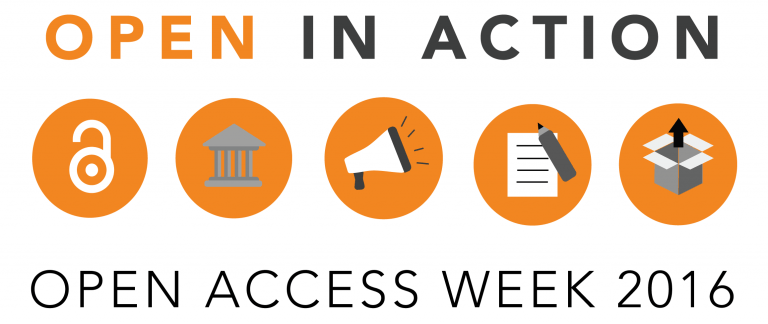POSTED BY SARAH THEISSEN, 24 OCTOBER 2016
Today is the beginning of this year’s annual Open Access Week. Now in its eighth year, this global event is an opportunity for the academic research community to continue to learn about the benefits of open access, to share what they’ve learned, and to inspire wider participation in helping to make open access the norm.
Simply adhering to open access mandates isn’t good enough anymore. To truly change the way science is communicated, action needs to be taken. Fittingly, this year’s Open Access Week theme of “Open in Action” is all about taking concrete steps to open up research and scholarship and encouraging others to do the same. In this blog post, we look at some of the ways we at F1000Research already do to work towards wholly open science
Open science
Open science is the concept of opening up all aspects of research, to allow others to follow the process and collaborate. Open science incorporates open access, open peer review, post-publication peer review, and open data. It also includes other ways to make science more transparent and accessible, such as open notebook science, citizen science, and aspects of open source software as well as some crowdfunded research projects.
Open notebook science

While some groups use online, password protected, lab notebooks to share notes with collaborators, open notebook science takes this a step further by making day-to-day lab notes available in real time. There is a general reluctance of many researchers to share ongoing research data in the fear of being scooped by competing groups in academia or industry, as well as being unsure whether they can still publish the work in their journal of choice afterwards.
Meanwhile, a partial sharing of ongoing data figures, conference posters or meeting slides is becoming more popular. You can submit slides and posters communicated at conferences to F1000Research completely free of charge
Open Data
The goal of Open Data is to make data available to anyone and reusable for further analysis. For over 15 years, the human genome project has illustrated that opening up research data makes it much easier for other scientists to build upon that work and advance the field.
Availability of all underlying data used to generate the figures in a paper makes it easier for others to reproduce the work. This complete transparency of data also discourages researchers from falsifying figures in their publication.
The F1000Research data policy mandates all primary research articles should include the submission of the data underlying the results, together with details of any software used to process results. Failure to provide such data for publication without good justification is likely to result in the article being rejected.
Open source software
Open source software refers to software that is distributed with the idea that it can be shared and used by others. For certain applications that is feasible, but at the moment, a lot of scientific research and communication often relies on software that is not open source. F1000Research publishes Software Tool Articles and mandates that the source code for new software must be made openly, and permanently available in a structured repository.
Open peer review
There has been a lot of discussion about the traditional model of single-blind peer review and how it is broken. The bottom line is that it is ripe for serious disruption. Some journals publish peer reviews alongside articles that are approved for publication so the reader can place the article in context and see what the reviewers contributed.
Post-publication open peer review

At F1000Research our goal has been to champion transparency in the peer review process: each article we publish includes the referees’ names and affiliations, their reports and the approval status. Referee reports are posted as they are received and the peer review status of the article is updated with every published report as well as version.
We believe this model truly speeds up the sharing of new findings and uses a transparent and constructive way to review articles. Especially in emergency situation such as the recent Zika outbreak, traditional peer review can severely delay the sharing of vital new research findings. We have a dedicated channel for Zika & Arbovirus Outbreaks and submissions to it are free until at least the end of the year to facilitate this.
Future of open science
Open access has been around for over fifteen years, and has been growing steadily over the past decade. Funding organisations are asking their academics to make their findings available freely and openly and with the recent launch of Wellcome Open Research one funder has even adopted our publishing model as a platform for their grantees.
Open peer review is becoming more popular, but post-publication peer review is still quite new. We believe that as it gains traction, reviews themselves will be cited and reviewers will add these activities to their publication records.
Despite a perceived fear of competition, and a reward system that still favours publication in exclusive, and often closed journals, scientific research is moving toward open science, and we wholeheartedly support Open Access Week 2016 and its ethos of Open in Action!
F1000Research is an original open science publishing platform for life scientists that offers immediate open access publication, transparent post-publication peer review by invited referees, and full data deposition and sharing. F1000Researchaccepts all scientifically sound articles, including single findings, case reports, protocols, replications, null/negative results, and more traditional articles.
